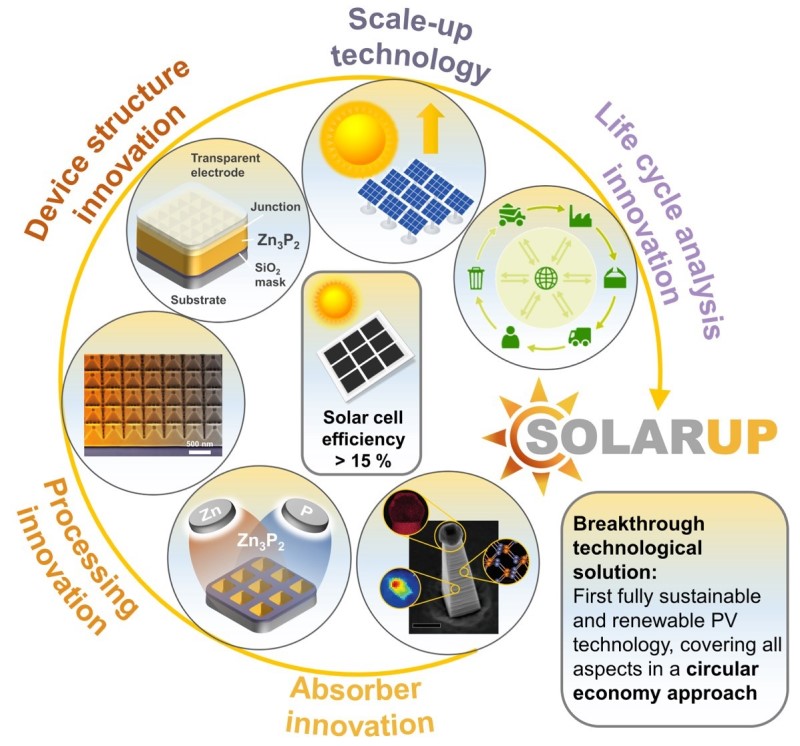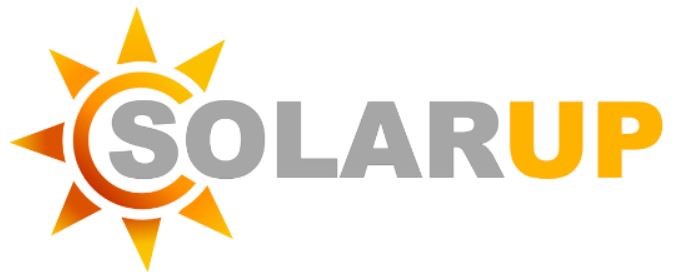Thursday, 08 September 2022
The SOLARUP project led by Prof. Jordi Arbiol receives an EIC Pathfinder Open grant
Aimed at the development of an innovative and scalable technology for solar energy conversion, SOLARUP will be coordinated by the ICN2, with ICREA Prof. Jordi Arbiol at the leadership.

The SOLARUP project will receive about 3 million euros from the European Union, through the EIC Pathfinder Open call, to develop a novel ultra-thin film photovoltaic technology that is scalable, sustainable, and cost-effective. It is one of the 59 projects selected (out of 868 evaluated proposals) in the first edition of the European Innovation Council (EIC) Pathfinder Programme, launched in 2021.
The coordination of the project is entrusted to ICREA Prof. Jordi Arbiol, leader of the Advanced Electron Nanoscopy Group at the ICN2. The consortium consists of research teams with complementary expertise from six European institutes: the Catalan Institute of Nanoscience and Nanotechnology (ICN2, Spain) – coordinator—, École Polytechnique Fédérale de Lausanne (EPFL, Switzerland), Friedrich-Schiller-Universität Jena (FSU-Jena, Germany), AMOLF (the Netherlands), Netherlands Organisation for Applied Scientific Research (TNO, the Netherlands), Lund University (Sweden).
"SOLARUP brings a great opportunity to develop solar cells and photovoltaic devices based on an earth abundant and low cost material (zinc phosphide, (Zn3P2)," explains Prof. Arbiol. "The project includes a careful study of the impact of the materials and devices after use in order to obtain environmentally friendly and recyclable products. We expect efficiencies >15% with nanoengineered flexible thin films that can be adapted to wearables and curved surfaces. We thank the EIC for funding this Pathfinder Open project, which will provide a more sustainable EU in the near future, looking for the CO2 emission reduction".
The EIC Pathfinder Open grants are meant to support early-stage development of radically new technologies (i.e., activities at low Technology Readiness Levels, between 1 and 4), based on high-risk/high-gain science-towards-technology breakthrough research in four main areas: health, environment, energy, computing and artificial intelligence. Selected projects will receive not only grants, but also access to tailored-made coaching under the EIC business acceleration services.

New photovoltaic technology for sustainable energy production
SOLARUP proposes a solar energy conversion technology that aims at reducing dependence on critical raw materials and overcoming efficiency thresholds. It will allow mass deployment of flexible photovoltaic (PV) solar cells, for application in smart buildings, soft robotics, wearable electronics, and other consumer products.
The main innovation brought about by this project lies in nanoengineering zinc phosphide (Zn3P2) for use as an earth-abundant direct bandgap semiconductor absorber. Combined with a novel device architecture, it enables cell efficiency to be increased by up to 15%.
The main outcome of SOLARUP will be the demonstration of an ultrathin-film PV technology that is scalable, cost-effective, and environmentally sustainable, complete with a comprehensive life cycle analysis. The researchers intend to feed and inspire the development of Zn3P2-based solar cells towards a market ready technology. In addition, since sustainability is a core aspect in the radical novel vision of SOLARUP, the approach they propose will allow reuse of the growth substrate.
Advanced manufacturing techniques, such as nanoimprinting and metal-organic vapour-phase epitaxy, will be explored to open industrially scalable routes to synthesise high quality Zn3P2 films. Optimisation of both the absorber structure and device architecture will be achieved through a holistic interplay of first-principles calculations and atomic scale structural and electronic characterisation.

